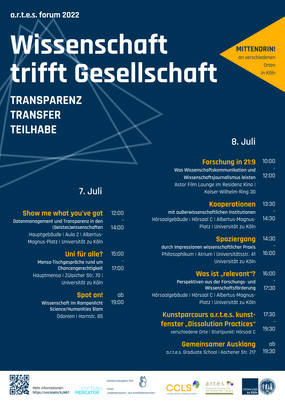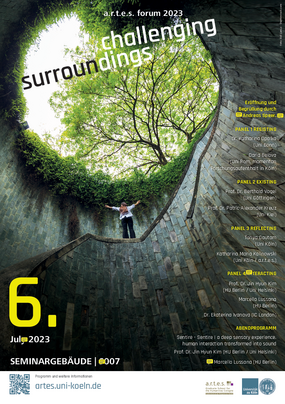a.r.t.e.s. forum
The purpose of the a.r.t.e.s. forum, the annual conference organised under the aegis of the a.r.t.e.s. Graduate School, is to enable doctoral students to autonomously plan and hold a major academic symposium. This enables them to start networking with national and international expert of a research field at an early stage and to gain experience of project management and event organization.
The general theme of the forum changes annually and focuses from an interdisciplinary perspective on fundamental questions of the Humanities also considering the underlying societal practices and areas of application. The aim of the a.r.t.e.s forum is to bring academics from different career stages and disciplines together for an exchange of views through presentations and discussions for one day – an approach that extends the fundamental interdisciplinary concept of the a.r.t.e.s Graduate School beyond the daily research work undertaken by its doctoral students. For the purpose of the forum, a.r.t.e.s invites eminent speakers from Germany and abroad to present their current research projects and invite discussion about them. The topics of past forums – Anthropologie (2009), Rezeption (2010), Transkulturation (2011), Episteme (2012), Sprache (2013), area studies (2014), reception and transculturation (2015), text – language – media (2016), environment | agency (2017) and societies and social pratices (2018) – generated an extensive and lively debate across disciplines and faculties.
The planning and organisation of the forum commences in the preceding winter term while the whole-day event itself takes place in May or June. During the preparatory phase, the members of the organisational teams first consider the core theme of the conference in various topic-related workshops. This involves the specific formulation of the theme and the design of its various different focally-orientated segments. This is followed by the selection and invitation of speakers, the preparation of the programme, marketing activities and the agenda together with the planning of fringe events.


